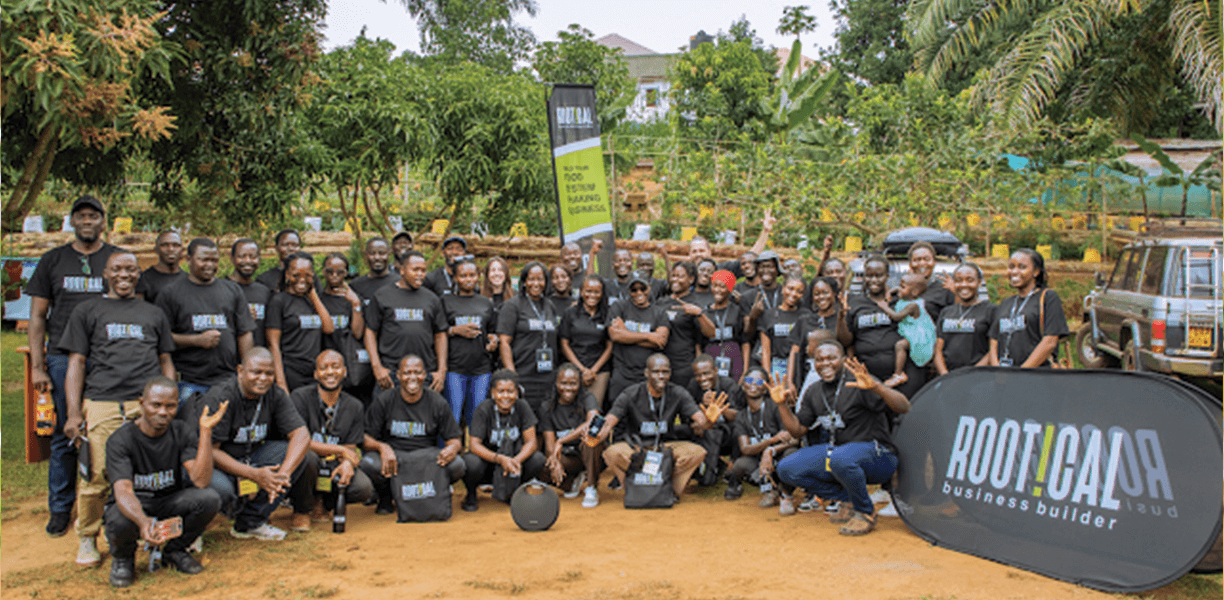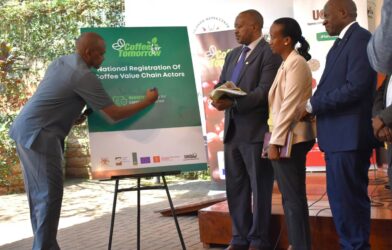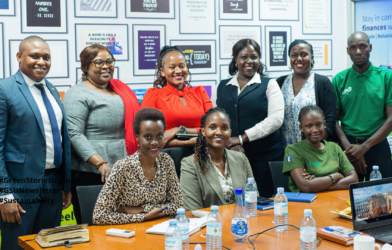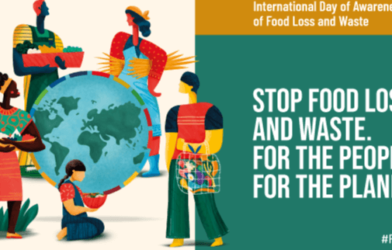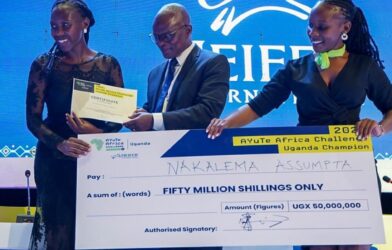Agriculture has long been the backbone of Uganda’s economy, employing a majority of the population and contributing significantly to GDP. However, conventional agricultural practices and agrochemical inputs have been leading to soil degradation, water scarcity, and other environmental challenges. We need to shift to regenerative agriculture practices that work in harmony with natural ecosystems to improve long-term productivity and resilience, community livelihoods, and environmental outcomes. In this exclusive story, we delve into Rootical’s ambitious journey and unique approach towards changing the food system by building purpose-driven businesses.
At Rootical we always ask two questions: what needs to be built for food system transformation? And, how do we fund it?
With its lush mountain covers, tropical rainforests and green, productive hillsides, Uganda is regenerative by nature. Comfortably located in the Great Rift Valley, its abundant water resources and mostly favourable climatic conditions make the Pearl of Africa a potential bread basket for the region. While the dream is to build an international network of regenerative venture studios that share our values and aim to accelerate the transition to agroecology via purpose-driven entrepreneurship — Rootical has started in Uganda for a good reason: Uganda is an Organic Champion Nation.
Uganda is Africa’s and the world’s leading nation with over 400,000 certified organic farmers (only preceded by India). The adoption of synthetic fertilisers and agrochemicals is still relatively low; yet it seems to be increasing at alarming rates. The country’s potential to mitigate climate change and restore water cycles while producing safe and healthy food with diversified, agroecological production systems, is enormous. In addition, the President’s vision for local and natural food, and the policy environment is quite favourable too.
There is a growing support system for agroecological entrepreneurs who are willing to take risks and start new businesses — including Rootical and Shona’s Neycha Accelerator & Fund. Yet, entrepreneurship is hard. Building businesses that are designed to transform the food system, even harder. Emerging regenerative agri-food businesses face a number of barriers. First, they struggle to grow beyond 5-10k$ annual revenues for a number of reasons, and lack investor readiness (record keeping, formalisation, tax registration, certification, etc).
Second, non-extractive and affordable capital along the growth journey is scarce. Grants and blended finance have proven to be key, yet they might also distort the founder journey early on and create new dependencies. Third, the business development ecosystem is fragmented and few work with Agroecology explicitly. Most programmes are short-term, light-touch, without providing access to finance nor do they have any skin in the game.
In other words, being an emerging food system entrepreneur is an uphill battle. We are strongly convinced that purpose-driven entrepreneurs can tap into the potential described above. They can build businesses that are commercially viable, scalable and impactful. And the regenerative venture studio model of Rootical, is probably one of the best ways to drastically increase their chances in doing so successfully.
A Rootical Purpose
Rootical is Uganda’s first regenerative startup studio. As a startup studio we are in the business of building businesses. Rootical brings together talent, ideas, and resources to germinate startups with the power to make a lasting impact in the food system. Unlike traditional incubation or acceleration programs, a startup studio — also known as a venture studio or business builder — starts before ideation, with a deep problem and food system analysis in our case. We don’t work with existing teams or businesses. As a startup studio Rootical is your experienced and active co-founder: we are more bespoke and hands-on than any other business development support initiative, we are committed long-term and deeply invested in the success of the businesses we build together. Startup studios are known to be more efficient, faster, and more successful at building businesses.
“ The Rootical purpose is to power purpose-driven entrepreneurs to build and own their regenerative agri-food companies: impactful enterprises designed to accelerate the transition to a more inclusive and regenerative food system.”
The Rootical founder journey can be described in 3 major steps. First, we spend 20+ hours with 40 potential founders to conduct a deep food system analysis and identify a pressing issue within the food system that you are excited about, refine your concept, and validate its market potential. This is also where you start exploring who could be your future co-founder.
Next, we go through 12 design sprints to ideate, prototype and develop a solid business model — while ensuring it addresses a real pain point of real people in the food system. We work towards building a minimum viable product to rapidly test with real customers and continuously gather valuable feedback, as much and as soon as possible.
Finally, when invited into the studio, that means Rootical is ready to invest in your business model and we are happy to continue piloting — learning by doing and driving real sales — until the conditions are met to incorporate and launch the business officially.

Impact: Our Theory of Transformation
Rootical provides talented entrepreneurs with access to expertise, funding, tools and a systemic approach to building business models. Through training, venture building, mentorship, networks and financial support (=inputs), Rootical contributes to the capacity of Ugandan entrepreneurs to build regenerative businesses (=output). These purpose-driven businesses are geared towards either supporting farmers in their transition to agroecology on the production side, or incentivising that transition by buying their produce and providing market access (=outcome).
This in turn accelerates the demand-driven transition to a more fair, inclusive, distributed and regenerative food system. This is expected to contribute positively to reduced hunger and inequality, to healthy diets — making healthy, nutritious food more affordable and available for all — and resilient and thriving ecosystems, local economies and communities (=impact).
We have trained 40 food system change-makers in 2023, of which 37% have taken on new roles in the agri-food system and 50% experienced some form of promotion or career advancement in the 9 months after joining Rootical. 86% Reported having implemented changes in practices in their organisations as a result of the regenerative agri-business training they have received in our bootcamp.
Moreover, we are building 4 exciting businesses at the moment:
● Eden Seeds: a farmer-owned indigenous seed company, sourcing from community seed banks and individual seed producers to develop the market for locally adapted seeds and heritage seed varieties.
● Ecologic: an organic input sales and distribution network based on the village-based agent model to unlock access to effective and affordable organic inputs for smallholder farmers.
● A natural preservative solution to extend the shelf life of tomatoes and other fruits and vegetables. This product aims to replace Mancozeb, the white powder on your tomatoes in the market, which is a toxic agrochemical known for causing cancer.
● A crop advance payment model to work with farmers, pay up to 30% of their harvest upfront, halfway the season, so they can take care of inputs, crop management, weeding, harvest labour, etc. This allows us to build trust and aggregate their produce to source for processors more reliably, both in quantity and quality.
Way Forward
These have been very insightful months. We’re learning fast and a lot, about how to take a regenerative business from 0 to 1 in Uganda, and how to best support our Founders-in-Residence.
If there’s one thing we are learning and reaffirming, it is that we’re in the business of talent. We are striving to become exceptional at attracting, selecting and nurturing talent — the founders we work with. We are looking for people that offer a mix of exceptional drive to have a positive impact, an entrepreneurial mindset, commitment, and availability.
We are also learning that giving priority to building with Rootical, when providing for one’s family and juggling with competing priorities at all times, is not an easy feat. We are looking at solutions to make sure founders can invest at least 3-4 days per week, which seems to be the minimum when building for scale.
More than ever, we are convinced that if we are working with the right people, at the right moment in their life journey… the right ideas and money will follow, no matter how many pivots, creativity and perseverance it would take.
Looking into the future
Rootical is about 60% funded to run two more cohorts in 2025-2027. We plan to launch our second Call for Founders (Cohort 2) in Uganda in October 2024, so stay tuned! After that, we also plan a Rootical replication in another East-African country. Rootical has already mobilised over 1 Million in funding and nearly 100,000$ in direct startup capital.
I am really excited about the topics we are working on and building businesses already: farmer seed systems, organic input production and market development, reinventing bulking models for streamlining supply chains, and developing natural solutions to mitigate major public health risks — like the Mancozeb on 99% of the tomatoes Ugandans eat. In addition, developing healthy and affordable consumer-facing food brands, based on the notion of nutrient density — simply put, one carrot can contain 15 times more nutrients than another carrot, if it has been cultivated naturally in healthy soils — is also a promising opportunity I would like us to work on.
What I find really fascinating is the impact we could have by developing business models that address the issue of landscape level degeneration due to deforestation, over- and under-grazing, and land use changes coming from crop agriculture. We are already exploring partnerships and a potential business model that acts at a watershed and landscape level to restore the landscape’s water holding capacity, biodiversity, and potentially even bring back (or stabilise) rains.

- NARRATED BY:
- FOUNDER ROOTICAL
- HANNES VAN DE EECHOUT





